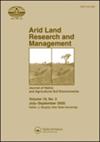Drought tolerance traits in Medicago species: A review
IF 1.6
4区 农林科学
Q3 ENVIRONMENTAL SCIENCES
引用次数: 9
Abstract
Abstract This review provides a comprehensive overview of the effects of drought on the growth of medic plants; then, it explores some drought tolerance traits including the morpho-physiological and biochemical parameters. In addition, medic plants were compared to other legumes and to cereals. At the molecular level, the response of Medicago plants to drought was also highlighted. Results of several independent experiments showed that the reduction of plant biomass production of medic plants ranged between 12 and 73% under water deficit stress. Cereals are more tolerant to drought than legumes. Yield reduction in cereals ranged between 25 and 40% versus 20 and 80% in legumes. For cereal species, wheat exhibited the lowest (25%) yield reduction as compared to barley and maize (34 and 40%), respectively. In legumes, reductions were about 20, 40, and 60% in lentils, chickpea, and common bean. Medic drought tolerance was found to be associated with traits like the ability to maintain the photosynthetic activity, the optimization of root development, the water use efficiency, the osmoregulation capacity via the decrease of osmotic potential, accumulation of mineral (K+) or organic solutes (proline), and the modification of carbohydrate metabolism toward the accumulation of soluble sugars. Water deficit stress induces a lipid and protein metabolism adaptation via the accumulation of some amino acids and the decrease in malondialdehyde concentrations. The target traits suggested in medic for breeding and for genetic engineering are related to water relations, such as relative water content, water use efficiency as well as root development.紫花苜蓿品种耐旱性状研究进展
本文综述了干旱对药用植物生长的影响;在此基础上,探讨了水稻的形态生理生化等抗旱性状。此外,还将药用植物与其他豆科植物和谷物进行了比较。在分子水平上,紫花苜蓿植物对干旱的响应也得到了强调。多个独立实验结果表明,在水分亏缺胁迫下,中药材的生物量产量减少了12% ~ 73%。谷物比豆类更耐旱。谷物减产25%至40%,豆类减产20%至80%。在谷物品种中,小麦的减产幅度最低(25%),大麦和玉米的减产幅度分别为34%和40%。在豆类中,扁豆、鹰嘴豆和普通豆的减少量分别为20%、40%和60%。水稻的抗旱性与维持光合活性的能力、根系发育的优化、水分利用效率、渗透电位降低的渗透调节能力、矿物质(K+)或有机溶质(脯氨酸)的积累以及碳水化合物代谢向可溶性糖积累的转变等性状有关。水分亏缺胁迫通过一些氨基酸的积累和丙二醛浓度的降低诱导脂质和蛋白质代谢适应。在育种和基因工程中提出的目标性状与水分关系有关,如相对含水量、水分利用效率和根系发育。
本文章由计算机程序翻译,如有差异,请以英文原文为准。
求助全文
约1分钟内获得全文
求助全文
来源期刊

Arid Land Research and Management
环境科学-环境科学
CiteScore
3.80
自引率
7.10%
发文量
23
审稿时长
9 months
期刊介绍:
Arid Land Research and Management, a cooperating journal of the International Union of Soil Sciences , is a common outlet and a valuable source of information for fundamental and applied research on soils affected by aridity. This journal covers land ecology, including flora and fauna, as well as soil chemistry, biology, physics, and other edaphic aspects. The journal emphasizes recovery of degraded lands and practical, appropriate uses of soils. Reports of biotechnological applications to land use and recovery are included. Full papers and short notes, as well as review articles and book and meeting reviews are published.
 求助内容:
求助内容: 应助结果提醒方式:
应助结果提醒方式:


